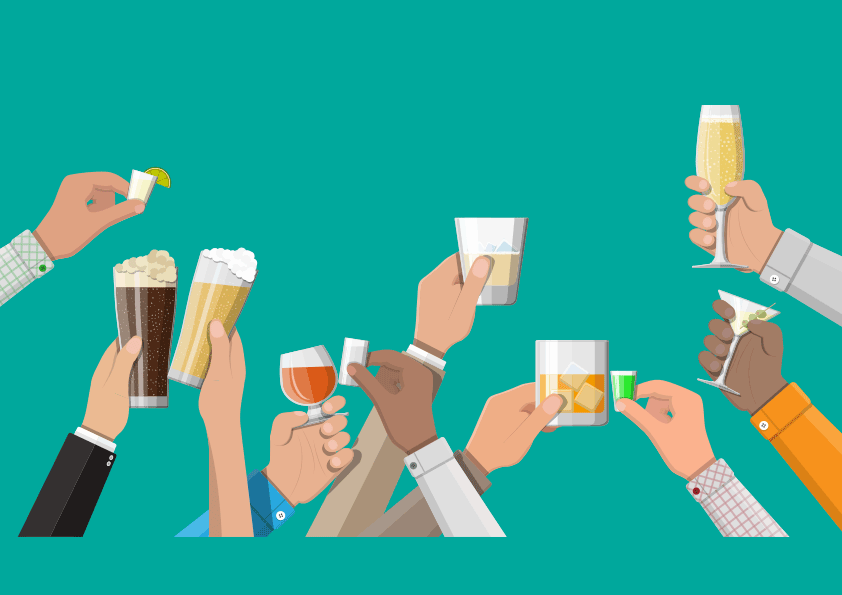Are you planning to serve alcohol at your company holiday party?
Any event company knows, alcohol at an event can be a nightmare if you don’t properly prepare. Check out the guidelines below for serving alcohol at your upcoming employee holiday events.

8 Tips for Safely Serving Alcohol at Company Events
Event, catering and other hospitality companies are notoriously busy during the holiday season. Which means more pressure, stress, and work for you and your staff. To help staff through the holiday season, many companies throw an annual holiday party (or parties). Holiday staff events are a great way to boost morale, foster comradery among staff, generate goodwill for the company, and allow employees to blow off some steam during the busy holiday season.
If you intend to serve alcohol at your upcoming employee event you’ve probably spent some time thinking about whether this is a good practice. You want your employees to enjoy their work-related parties, but you also want to keep your employees safe and your business liability-free. If you don’t want to run a prohibition-style, dry event there are safe ways to entertain with alcohol.
We all know hospitality is no stranger to drinking, and many of the rules you have for your clients' events apply well for your events. If you plan on serving alcohol at your annual holiday party here are some things you’ll want to keep in mind to prevent disaster and/or liability:
1. Plan Well
If you’re in the hospitality industry or the event planning business, planning a party is perfectly in your wheelhouse. But it’s always good to remember that even though this event is for your staff and not a client, it should still be well-planned from start to finish.
That means booking a restaurant, hotel or venue well in advance. Hiring professional catering or bar staff if none are provided by the venue. Making sure your company’s insurance covers offsite company events. And ensuring adequate transportation options are available to and from the event.
2. Prepare for Minors to Attend
While this technically falls under "planning well", it’s important enough to be its own point. If any of your employees are underage or you allow underage guests, you’ll need a plan for identifying minors. You need a set system for identifying who can and cannot legally be served alcohol. Whether it’s carding at the door and giving out wristbands, carding everyone at the bar, handstamps, or any other system - make sure your system is pre-planned, clear, and communicated to all event staff ahead of time. This makes bar service quicker and more efficient, while providing CYA benefits.
3. Provide Non-Alcoholic Drinks
There should also be plenty of non-alcoholic drink options. For a variety of reasons, not all of your guests may drink and some employees may prefer not to drink at a company event. From fizzy sodas to mocktails, create some variety for your non-alcoholic menu. Offering non-alcoholic drink options beyond water helps all guests feel included and can prevent overconsumption.
On that note: offer an abundance of water. Leave pitchers or decanters on the tables. Have flavored waters at the bar. Let the ice water flow plentifully. Serve water along side drinks at dinner. It’s easy to unintentionally neglect to drink enough water when you have a cocktail in hand, by leaving water out and accessible you are reminding guests to stay hydrated throughout the night.
4. Serve Food Early and Often
This should come as no surprise to most catering and event companies. I mentioned dinner above, yes - serve dinner (or a meal). Food is not the area to cut out of your holiday party budget. Don’t just leave out bowls of nuts and half-assed charcuterie platers. To limit excessive intoxication provide ample food options.
Start serving food from the start of the event so employees are not drinking on an empty stomach and make sure some food is available near the end. Also, consider including a meal that requires sitting down and eating. This allows a natural break (or slowing down) of the drinking and prevents employees from filling up on drinks out of hunger.
5. Limit the Number of Drinks
We’ve all heard horror stories from events-gone-wrong after an employee drinks just a bit too much at the company party. While it is on the individual to not overindulge, you can help reduce liability and safeguard your employees by limiting company provided drinks.
For this reason, open bars at an event are an awful idea! Yes, you want guests to mingle and have a good time, BUT you also want to avoid a serious incident. The easiest way to do this is to provide drink vouchers and limit drinks to 2-3 per person. Although not a perfect system - employees can always get extra vouchers from non-drinking coworkers - drink tickets set a hard limit that most employees will adhere to.
To further prevent overserving, rely on a trained (non-employee) bartender and outsource your event staff. Avoid letting employees self-serve or serve to coworkers. In fact, never provide a self-serve beverage bar that includes alcoholic beverages. There are a lot of liability issues with situations like this (overserving and serving minors, for one). So, having a trained, outside bartender serving all drinks is the safest way to keep employees in line.
6. Shorten Happy Hour
Your company holiday party is not a college house party which means drinking should not creep into the early hours of the morning. By having a limited window in which the bar is open you’ll prevent employees from drinking themselves into a stupor.
Set a reasonable end time for your event and close the bar roughly an hour before that. This helps signal the end of the event to your guests and gives anyone who’s had a little too much to drink enough time to sober up before leaving. While employees may opt to continue their party at a nearby bar, for liability reasons it’s best not to allow too much drinking at the company-sanctioned event.
7. Don't Make Alcohol the Focus of The Event
Keep why you're getting together at the forefront of the event. The purpose is not to get wasted on the company's dime; it's to enjoy each other's company, celebrate the team, and reward hard work. Be careful not to make drinking the main focus of any company event.
That means your event should have more to it than just drinks and food. Plan for entertainment, speeches, games, music and dancing, and/or activities for employees to participate in. If your budget is small even a speech from management and cheap games or activities works well to set the tone. This shifts the focus to fun and team-building.
8. Keep Safety in Mind
You need to do everything in your power to prevent inebriated guests from getting behind the wheel. Before your event, encourage employee carpooling and sober rides. If you can, schedule the event at a location that offers easy access to public transportation. For large events, consider partnering with a shuttle service or rideshare company to offer free or discounted rides to guests.
During the event, get an understanding of how your attendees are coming and going. Watch the exits carefully and have your security staff on alert as the event winds down. At the end of the night remind guests of transportation options and have phone numbers to cab companies handy for guests that may need them. You don’t need to babysit your guests, but remind employees to plan safe rides home.
This is especially important for any caterers or event companies with a liquor license. An employee incident can put it and your business in jeopardy.
Being prepared and responsible when hosting a company party that includes alcohol will ensure a successful event. Alcohol can be a festive addition to a company event, but at company events, as in your workplace, employee safety is your top concern.
While you’re busy planning your next big event (for your staff or a client), let us worry about scheduling and payroll so you can focus on what matters. Use Roosted to make managing staffing logistics simple - saving you time and money. We can help manage staff and event scheduling, track employee performance metrics, utilize time tracking reports, and more. Contact a Client Success Engineer for more information on how we can support your business.
